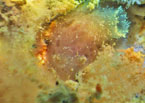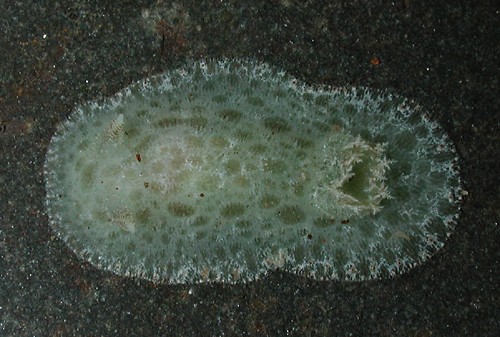| Home |
| Acknowledgments |
| Conventions |
| Glossary |
| Maps |
| References |
| Links |
| Articles |
| Thumbnails |
| Species
list |
| Family |
| Next
species |
Additional Photos

underside

rhinophores

branchia

violet brown

young

feeding

egg mass
_______________
GALLERY

Jorunna alisonae Marcus, 1976

| Maximum size: 20 mm. Identification: This is a greenish brown to violet brown dorid blotched with darker brown and frosted with white. It may be distinguished from Discodoris lilacina by its soft texture. Natural history: Jorunna alisonae is a common species that is primarily found in the low to mid intertidal at protected to moderately exposed rocky sites. Rarely, it can be found to depths of 1.5 m (5 ft). According to Kay (1979), it feeds on the violet-brown sponge Haliclona permollis. However, we have also found it on the same turquoise sponge (Haliclona caerulea) that is eaten by the similar-appearing Discodoris lilacina. (Note 1) It lays a cream egg mass that hatches in six to seven days in the laboratory. Distribution: Big Island, Maui, Lanai, Oahu and Kauai: also known from Indonesia and the Marshall Islands. Taxonomic notes: There's some possibility that the greenish brown and violet brown animals might turn out to be different species. It was first reported from Hawaii in Kay & Young, 1969 (as Jorunna tomentosa). Photo: CP: 20 mm, greenish brown: Hekili Point, Maui; Sept. 26, 2007. Observations and comments: Note 1: On Oct. 17, 2009, two J. alisonae were found on a turquoise encrusting sponge (Haliclona caerulea) in the low intertidal at Hekili Point, Maui. Although they weren't observed actively feeding, the presence of pigment in their digestive glands similar in color to the sponge supports the suggestion that they were eating it. (see photos) Perhaps, occasional feeding on this species explains the occurrence of the green color form? |
| Thumbnails |
Species
list |
Family | Next species | Top |